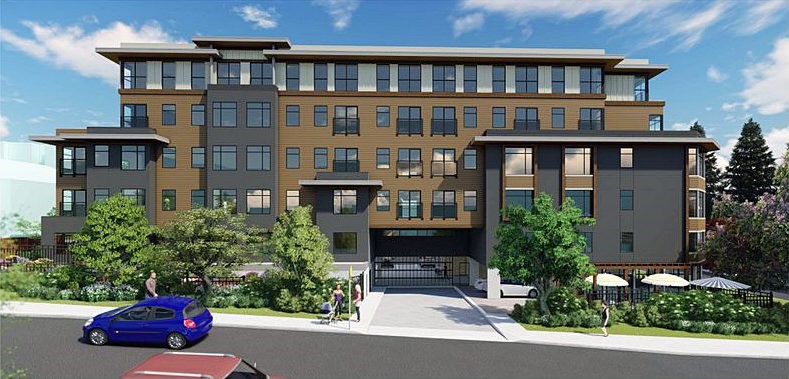Despite neighbourhood concerns, a proposal to replace 21 units of affordable housing at 210 Gorge Rd. East with a six-storey mix of affordable and supportive housing will go to public hearing.
Victoria Cool Aid Society, a charitable organization that provides shelter and other services to the disadvantaged and homeless, hopes to redevelop the site.
Plans are to demolish the Cedar Grove motel, a two-storey, two-building operation with 21 units, and replace it with an 82-unit building.
The new building would have 50 affordable units and 32 supportive rental units staffed around the clock.
The cost is estimated at $18 million to $19 million. Cool Aid has received a number of grants and commitments, including a $450,000 grant from the Sisters of St. Ann, $600,000 grant from the Capital Regional District’s Regional Housing Trust Fund and $5 million from the Regional Housing First Program.
The Bunside Gorge Community Association has called for a moratorium on development of more shelters and supportive housing in its neighbourhood.
It says the area already is home to 77 per cent of Victoria’s shelter beds and 36 per cent of its supportive housing units.
The association says there are concerns about the lack of support from operators in dealing with problems around existing facilities.
In a letter to council, the association’s land-use committee said it would be more supportive of the proposal if it were four storeys and the number of supportive units was reduced.
The majority of those attending the land-use committee meeting were concerned the affordable units would eventually be filled with supportive housing clients, wrote Avery Stetski, land use committee chair.
A straw vote at the meeting saw the proposal opposed 24-1, he said.
Coun. Geoff Young, council liaison to the neighbourhood, noted the proposal is not at all consistent with the just-adopted Burnside Gorge Local Area Plan, yet the intent seems to be to bend the plan to make the proposal fit.
“The building would not be contemplated if it were a pure private sector building,” Young said.
“That’s my concern and that’s why I am unfortunately not able to support this, wearing my hat as a local councillor.”
Despite the concerns, the majority of councillors agreed to send the proposal to public hearing.
Coun Ben Isitt said he would like to hear from the public on the matter.
Mayor Lisa Helps pointed out that as Regional Housing First proposals start to roll out there is the need to understand that “it’s a very different model than previous affordable housing.
“Each building will have units that rent out for $375 and are supportive, some units that rent at about 50 per cent of market and some units that rent at closer to market.”
Helps explained the formula ensures a mixed-market model and that there is no segregation with “40 poor people living in one building and ‘regular renting people’ living elsewhere.”
In 2016, the CRD committed up to $30 million to establish the RHF program to help meet the needs of chronically homeless individuals.
The provincial and federal governments awarded matching funds, bringing the total investment to $90 million. Island Health has also agreed to participate by providing health supports to tenants as required.
Young said the new housing model “will take significant input from provincial health authorities” to work successfully.
“It’s not simply a philosophical approach. It’s one that will require different inputs and different methods of operation. And I suspect there will be some bugs to work out.”



